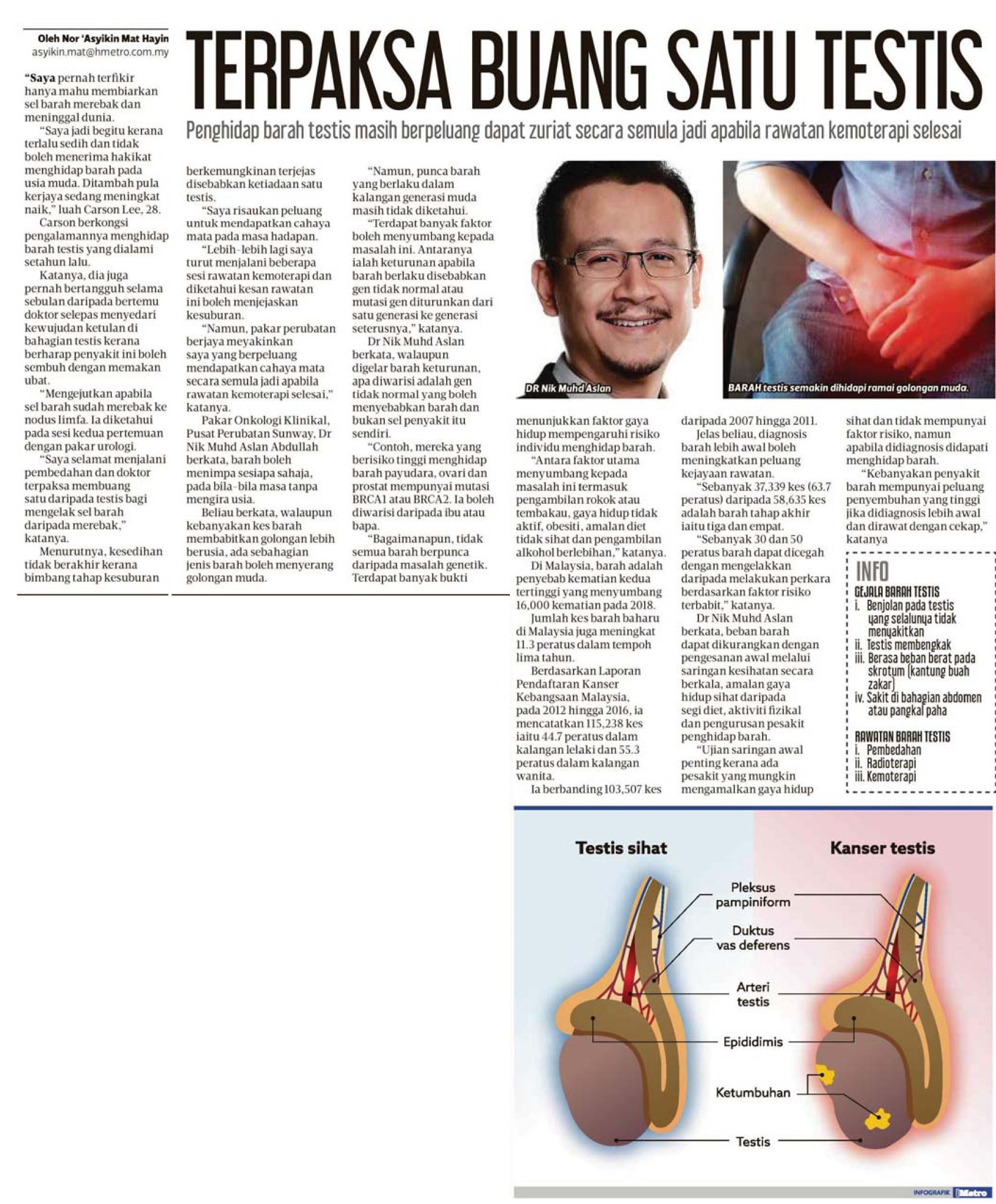Cancer – When You Least Expect It
06 December 2020

“I once thought I would just let the cancer cells spread and die.
“I had that thought because I was too upset and could not accept the fact that I had cancer at such a young age, especially when my career was about to take off,” said Carson Lee*, 28.
Carson shared his experience with testicular cancer he suffered since a year ago.
He said that he also delayed seeing a doctor for a month after discovering a lump in his testicles because he hoped it could be cured just by taking medicine.
“It was a shock when the cancer cells had spread to the lymph nodes. It was made known during my second session with a urologist.
“I underwent surgery and the doctor had to remove one of the testicles to prevent the cancer cells from spreading,” he said.
According to Carson, the grief did not end because he was worried that his fertility level might be affected due to the absence of one testicle.
“I am worried about the opportunity to have a child in the future.
“Moreover, I have undergone several sessions of chemotherapy treatment and it is known that the effects of this treatment can affect fertility.
“However, the doctors managed to convince me that I have the opportunity to have a child when the chemotherapy treatment is complete,” he said.
Sunway Medical Centre Consultant Clinical Oncologist, Dr Nik Muhd Aslan Abdullah said cancer can affect anyone, at any time regardless of age.
He said, although most cancer cases involve the elderly, there are some types of cancer which can affect young people.
“However, the cause of cancer among the younger generation is still unknown.
“There are many factors that can contribute to this disease. Among them is hereditary when cancer occurs due to abnormal genes or gene mutations that are passed down from one generation to the next,” he said.
Dr Nik Muhd Aslan said, despite being called hereditary cancer, what is inherited is an abnormal gene that can cause cancer and not the disease itself.
“For example, those at high risk for breast, ovarian and prostate cancer have a BRCA1 or BRCA2 mutation which can be inherited from a parent.
“However, not all cancers are caused by genetic problems. There is ample evidence that lifestyle factors influence an individual's risk of developing cancer.
“Among the main factors contributing to cancer include cigarette or tobacco consumption, inactive lifestyle, obesity, unhealthy dietary practices and excessive alcohol consumption,” he said.
In Malaysia, cancer is the second highest cause of death accounting for 16,000 deaths in 2018.
The number of new cancer cases in Malaysia has also increased by 11.3% in five years.
Based on the Malaysia National Cancer Registry Report, in 2012 to 2016, it recorded 115,238 cases which is 44.7% among men and 55.3% among women. This compared to 103,507 cases from 2007 to 2011.
He explained that early cancer diagnosis can increase the chances of successful treatment.
“A total of 37,339 cases (63.7%) of the 58,635 cases were end-stage cancers, namely three and four.
“As much as 30% and 50% of cancer can be prevented by avoiding activities based on the risk factors involved,” he said.
Dr Nik Muhd Aslan said, the burden of cancer can be reduced with early detection through regular health screening, healthy lifestyle practices in terms of diet, physical activity and management of cancer patients.
“Early screening tests are important because there are patients who may adopt a healthy lifestyle and do not have risk factors, but when diagnosed they have cancer.
“Most cancers have a high chance of recovery if diagnosed early and treated efficiently,” he said.
*Name has been changed to protect the privacy of the individual.
Source: Harian Metro
Back


